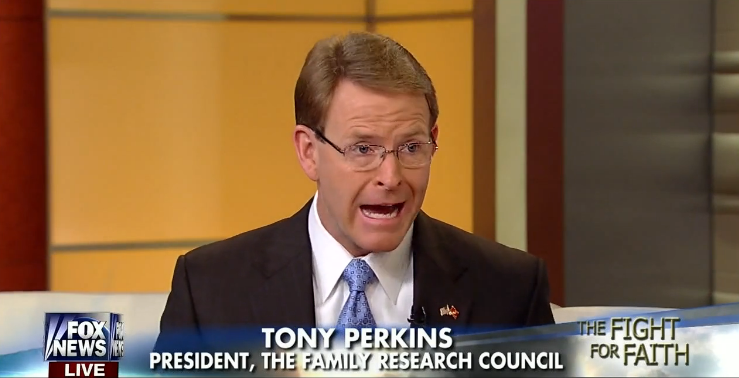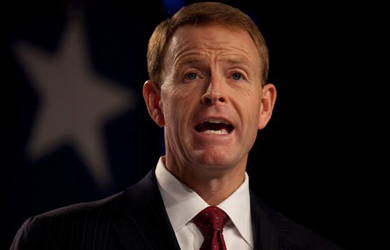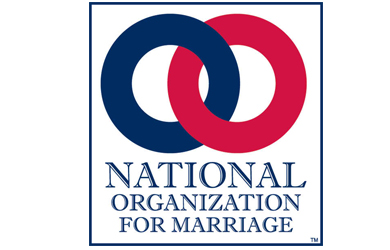The Republican Party’s platform committee started meeting in Cleveland this morning to hash out final language that will be presented to delegates at the Republican National Convention next week. Religious Right activists have been gearing up for months to make sure that the platform keeps the anti-gay and anti-abortion language they say will be needed to secure social conservatives’ loyalty to the GOP in November. A draft shared with members of the platform committee on Sunday night reportedly keeps the party’s anti-abortion position intact and continues the party’s opposition to marriage equality, though the draft reportedly abandons a previous call for a constitutional amendment banning marriage for same-sex couples nationwide in favor of leaving the decision on marriage to the states.
In May, right-wing Iowa Rep. Steve King, R-Iowa, told Fox News that his goal was “to get as many solid, constitutional conservatives to Cleveland and onto the platform and rules committees.” That same month, The New York Times reported that Ted Cruz supporters, including former Virginia Attorney General Ken Cuccinelli, were out to “fill the Rules and Platform Committees with strong conservative voices.”
In 2012, platform committee deliberations were dominated by a handful of right-wing activists who stripped out or batted away any moderating language, including tepid language about treating all people equally under the law. A Religious Right stalwart, then-Virginia Gov. Bob McDonnell, chaired the committee and made it clear that he wanted no distracting fights. The final result was the most conservative platform ever, calling for the criminalization of all abortions without exception and decrying marriage equality as “an assault on the foundations of our society.”
It looks like Trump may be following the same strategy of keeping the Religious Right happy by letting them have their way with the platform. On Sunday, the Times’ Jeremy Peters reported that Trump is keeping his distance from battles that have been brewing over the platform’s anti-gay language.
Overseeing all this is Republican National Committee Chairman Reince Priebus, who has been assuring social conservatives that Trump “is not wanting to rewrite” the platform. Trump adviser Paul Manafort has sent the same message.
Social conservatives praised the May announcement that the platform committee would be led by anti-choice Sen. John Barrasso of Wyoming along with co-chairs Rep. Virginia Foxx of North Carolina and Gov. Mary Fallin of Oklahoma. At the time of the announcement, Barrasso said “it’s going to be a conservative platform that reflects our values, freedom, liberty and limited government.”
All the co-chairs have solid right-wing records. Foxx, for example, has fought marriage equality and sought to strip Planned Parenthood of federal funding; last month she told attendees at Ralph Reed’s Road to Majority conference, “If people of faith are not involved in political life, then you’re leaving it to the Philistines.” Fallin has been mentioned as a potential VP pick for Trump even though she angered some anti-abortion activists when she vetoed a patently unconstitutional bill that would have made it a felony for a doctor to perform an abortion.
Some of the same activists who wrote 2012’s far-right platform are back on this year’s committee, which consists of two delegates selected by each state party and leaders chosen by the RNC. Among the members of this year’s platform committee:
- Tony Perkins, head of the intensely anti-gay and anti-choice Family Research Council, who has publicly stated that his support for Trump’s nomination will require a platform that does not include any “watering down” of language on social issues.
- David Barton, discredited “historian” whose Christian-nation ideology has infused much of the Religious Right and the GOP.
- James Bopp, a far-right lawyer who has led legal attacks on campaign finance laws and represented anti-abortion and anti-equality groups. In 2012, Bopp vocally opposed a young delegate’s proposal that the party recognize civil unions, which he denounced as “counterfeit marriage.”
- Len Munsil, founder of the right-wing Center for Arizona Policy, Republican nominee for governor in 2006 (when he was crushed by Janet Napolitano), and current president of Arizona Christian University; LifeSiteNews said Munsil “agrees both on the importance of the GOP’s moral stance and the need to stand up for it in Cleveland.” Munsil was among the recipients of a 2015 letter from then-candidate Mike Huckabee to Religious Right leaders vowing to “refuse to surrender to the false god of judicial supremacy.”
Among others identified by the New York Times:
There is Cynthia Dunbar of Virginia, who has compared the gay rights movement to Nazism. Hardy Billington, a committee member from Missouri, placed an ad in a local paper asserting that homosexuality kills people at two to three times the rate of smoking. And Mary Frances Forrester of North Carolina has claimed that the “homosexual agenda is trying to change the course of Western civilization.”
In the spring, after Perkins was elected to represent Louisiana on the platform committee, he bragged:
In 2012, my role as a delegate gave me the opportunity to play a key role in amending the marriage plank, which led to the committee approving a much stronger version than 2008’s. We also tightened language on obscenity and pornography, protected conscience rights, explained how abortion hurts women, and supported the Second Amendment in DC.
In a June fundraising letter, Perkins touted his return to the platform committee while warning that “homosexual activist groups, pro-abortion groups, and special interests are trying to transform the Republican platform” to make it more like the “anti-Christian, anti-religious, radical humanist-secularist viewpoint” he said was reflected in the Democratic platform:
Never before have we planned to exert so much influence on a political party’s convention as we are regarding the Republican Convention less than 50 days from now in Cleveland…I will serve as an official member of the 112-member Platform Committee, with our entire Action team supporting me, in order to make the greatest impact possible–again, regardless of the nominee — for faith, family, and freedom…What goes into the official Party platform could make a monumental difference in shaping public policy decisions for our nation in the next four years, and as a result it will impact our lives and the lives of our families and our churches.
Here’s how the battle has been shaping up on LGBT equality and reproductive choice:
LGBT Equality
After anti-gay Religious Right activists got what they wanted in the 2012 platform, LGBT Republicans and their allies launched an organized and well-funded campaign to get better language in the 2016 platform, an effort that conservative leaders have vocally resisted:
“Conservative forces need to understand there is a serious challenge, and they need to take it seriously,” warned Jim Bopp, a social conservative activist who was influential in designing the 2012 GOP platform.
Similarly, Eagle Forum president Ed Martin said, “We’re prepared for the fight. It’s hand-to-hand combat.”
Some pro-LGBT Republicans have seen Trump’s primary victory as an opportunity, since he does not seem to share the Religious Right’s anti-gay ideological convictions, though he has publicly supported their opposition to marriage equality and pledged to appoint conservatives to the Supreme Court. But Trump seems uninterested in standing up for LGBT people if it means picking a fight with his new pals in the Religious Right. For example, Trump has retracted his earlier criticism of North Carolina’s recently passed anti-LGBT law, saying that he now supports it.
Some change in the platform language will be required to deal with the changed reality caused by the Supreme Court’s 2015 ruling that made marriage equality the law of the land. CBS News reported over the weekend that “moderate Republicans are drafting an amendment that would soften the GOP’s official position on gays and lesbians.” According to CBS, some conservatives may be willing to accept general “equality for all people” language that they rejected in 2012 as a way to “keep the fighting at a minimum.” David Barton told CBS that there might be “rhetorical changes in how it’s communicated, but I don’t think support for natural marriage will diminish at all.”
The new draft platform that will be debated and amended this week does include an explicit rejection of the Supreme Court’s marriage equality ruling, calling for “reversal, whether through judicial reconsideration or a constitutional amendment.”
Given the high-profile fight over North Carolina’s HB 2, and social conservatives’ efforts to create panic over the idea of transgender people using bathrooms that match their gender identity, it seems likely that the platform will include some anti-transgender language, something Cuccinelli told The New York Times that he thought delegates should do.
Access to Abortion
Many Religious Right activists are skeptical of []Trump’s commitment to the anti-abortion cause, particularly given comments he made in April that he would like to change the platform to include exceptions to its call for a ban on all abortions for cases of rape, incest or when a woman’s life is at stake. The current platform adopted in 2012 supports a constitutional amendment and legislation applying the 14th Amendment’s protections to “unborn children.”
Operation Rescue President Troy Newman and other anti-choice activists are planning to have an active presence in Cleveland in order “to ensure that the GOP platform remains strongly pro-life.”
Newman, who has a record of anti-choice extremism, has sounded the alarm:
“Once again, there is a movement within the GOP to not only gut the pro-life planks from the party platform, but silence the voices of pro-lifers who are demanding an end to abortion,” said Newman. “Softening its position on abortion would spell disaster for the Republican Party and for the future of our nation. I cannot support a party that will not defend the innocent, and I know I am not alone.”
“The eyes of the world will be focused on Cleveland, OH this summer as the GOP nominates their candidate for the President of the United States. Decisions will be made at the convention that will influence our nation for a generation. A coalition of pro-life groups and activists is forming to take advantage of this historic opportunity to collectively raise our voice for the pre-born. We demand the Republican Party continue to defend the preborn, but we are also calling our nation to repent for 43 years of unabated child killing,” said Mark Harrington, National Director of Created Equal.
The National Pro-Life Alliance has also been sending out emails warning that abortion “supporters and apologists would like to eradicate the only pro-life language in either party’s platforms.” The group has been collecting signatures for a “Hands Off the Pro-Life Plank” petition.
But anti-choice activist Austin Ruse isn’t worried. Ruse, one of the conservative Catholic leaders who took part in Trump’s June meeting with Religious Right activists, said at the end of June that while he isn’t convinced of the sincerity of Trump’s opposition to abortion, he believes Trump will “let our side do exactly what we want to do” on the issue.
Similarly, right-wing strategist Richard Viguerie told LifeSiteNews this spring that Trump “has zero chance” of changing the abortion plank in the platform.
State Previews
Some state parties had their own versions of these platform battles. In May, for example, delegates to the Illinois GOP convention “overwhelmingly voted to retain” a plank defining marriage as “between one man and one woman,” rejecting proposed language that “non-traditional families are worthy of the same respect and legal protections as traditional families.”
Some states had bigger fish to fry. At the Texas convention in May, the state platform committee initially endorsed a call for a referendum on Texas declaring independence and seceding from the United States, but that language was not embraced by the party as a whole. Still, the Texas GOP platform did call for legislation requiring people to use facilities “that correspond with their biologically determined sex” and, in the words of the Texas Tribune, “included strong disapproval of gay lifestyles and no state restrictions on ‘access to sexual orientation change efforts for self-motivated youth and adults.’”








